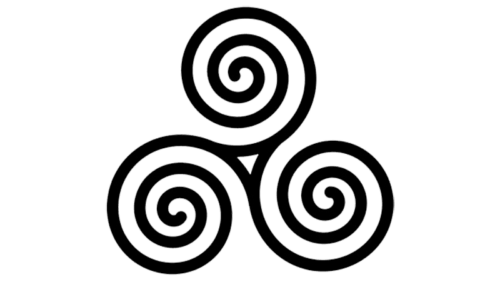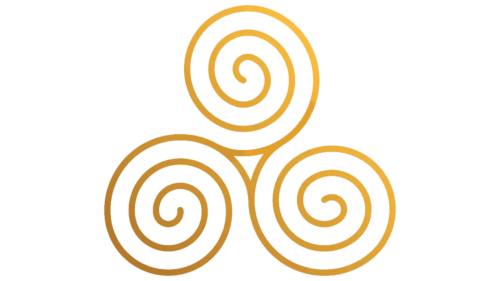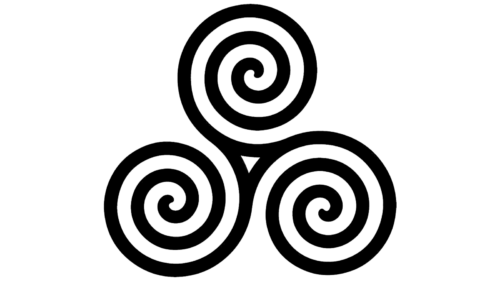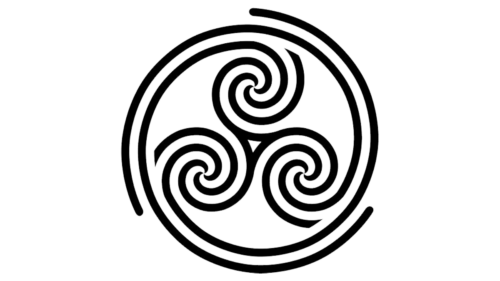The realm of Celtic symbols is a tapestry woven with myths, legends, and profound meanings that have traversed time and culture. Originating from the ancient Celts, these symbols embody a civilization deeply connected to nature, the spiritual realm, and the cosmos. While symbols like the intricate Celtic Knot, the emblematic Claddagh, and the revered Tree of Life each tell a unique story, they only scratch the surface of this rich symbolic heritage. However, the focus of our exploration is on a particularly captivating symbol: the Celtic Triskele.
The Celtic Triskele, also known as the Triple Spiral, stands out with its distinctive design. Comprised of three interconnected spirals or three human legs bent at the knee, this symbol is far more than an artistic creation; it is a repository of wisdom and a mirror of the universe as perceived by the ancient Celts.
In-Depth Look at the Triskele’s Symbolism
A Journey Through Time and Space: The spirals of the Triskele evoke the continuous movement of time and space, symbolizing the fluidity and perpetual motion of life. It is a reminder that life is not static but a dynamic, ever-evolving journey.
The Power of Three: The number three has always been mystical, representing balance and harmony in various cultures. In the context of the Triskele, it could symbolize a range of triads – past, present, and future; mother, father, and child; or even the three Celtic realms of land, sea, and sky. This trinity concept is a cornerstone in Celtic philosophy, highlighting the interconnectedness of different life aspects.
Seasonal and Cosmic Significance: Interestingly, the Triskele is also linked to the sun’s movement and the changing seasons. Each spiral can be seen as a nod to the solar cycle – the rising and setting of the sun, and its zenith. This celestial connection underlines the Celts’ reverence for the sun as a life-giving force.
Modern Adoption and Interpretation: In contemporary times, the Triskele has found new resonance. It is a popular motif in modern Celtic art and is often seen in jewelry, tattoos, and decorative arts. It also holds significance in neo-pagan and Wiccan practices as a symbol of spiritual growth and enlightenment.
List of Varied Applications of the Triskele:
- In heraldry, as a symbol of resilience and strength.
- As a motif in architectural designs, it symbolizes balance and harmony.
- In literature and film, often used to represent characters or places connected to Celtic heritage.
- Personal adornment, such as pendants and rings, embody personal or ancestral connections to the Celtic culture.
Did you know?
The Triskele was once used on the battle shields of ancient Celtic warriors! This usage underscores its perceived power to protect and empower, a testament to its deep-rooted significance in Celtic life.
The Universal Language of Celtic Symbols
In essence, the study of Celtics symbols meaning unveils a world where art, spirituality, and nature converge. The Celtic Triskele, in all its complexity, serves not just as a historical artifact but as a living symbol that continues to inspire and fascinate. It encapsulates the essence of the Celtic spirit – resilient, deeply connected to the earth, and ever-evolving. Through symbols like the Triskele, we gain a deeper appreciation of the rich Celtic legacy, a legacy that continues to echo through time.
Celtic Triskeles Tattoo
The Celtic Triskele, a symbol rich in history and meaning, has found a prominent place in the world of tattoos. In the form of a tattoo, the Triskele transcends its ancient roots, becoming a personal emblem for those who wear it. This section delves into the significance of the Celtic Triskele as a tattoo and its popularity in contemporary body art.
Personal and Spiritual Significance
A Mark of Identity and Heritage: For many, a Celtic Triskele tattoo is a way to connect with their Celtic heritage. It’s a form of honoring ancestors and acknowledging a lineage that is steeped in rich traditions and cultural depth. This tattoo serves as a permanent reminder of one’s roots and a symbol of pride in one’s heritage.
Spiritual and Philosophical Symbolism: Beyond its cultural significance, the Triskele tattoo is often chosen for its spiritual meanings. As a symbol that represents life’s continuous movement and eternal cycles, it resonates with individuals who see life as a journey of growth and transformation. It’s a tattoo choice for those who embrace change, personal evolution, and the interconnectedness of body, mind, and spirit.
Popularity in Modern Tattoo Art
The Celtic Triskele tattoo has seen a surge in popularity, transcending cultural boundaries. Its intricate spirals and deep symbolism make it a favored design among those who prefer tattoos with a meaning that is both personal and universally resonant. Tattoo artists often incorporate modern elements or additional Celtic motifs to create unique designs that cater to individual tastes while preserving the ancient symbol’s integrity.
- Versatility in Design: One of the appealing aspects of the Triskele tattoo is its versatility. It can be adapted to different sizes and styles, making it suitable for various body parts. From small, discreet designs to large, detailed pieces, the Triskele can be tailored to the wearer’s preference, each variation holding its special significance.
- Combination with Other Celtic Symbols: Often, Triskele tattoos are combined with other Celtic symbols like the Celtic Knot or the Tree of Life, enhancing their symbolic meaning. This amalgamation not only adds to the aesthetic appeal but also allows for a more personalized representation of one’s beliefs and values.
In conclusion, the Celtic Triskele tattoo is more than just a trend; it’s a powerful symbol that carries centuries of history, rich symbolism, and personal significance. Whether as a tribute to one’s Celtic roots or a representation of personal beliefs and life philosophy, the Triskele tattoo remains a profound and popular choice in the world of body art.










